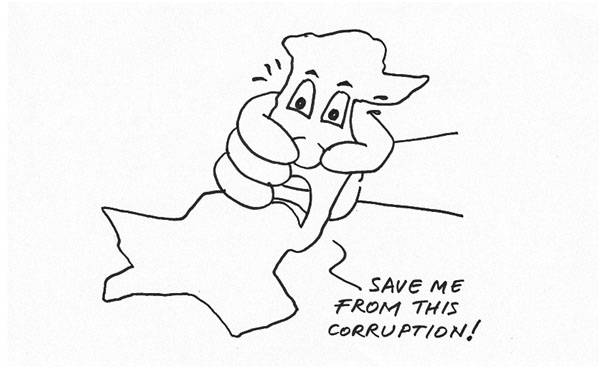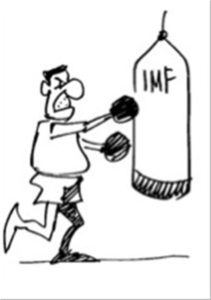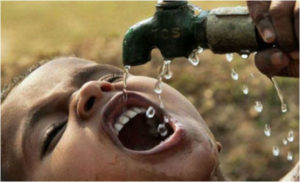
Our debt to Quaid
Sir,
Reference to politicking and media reports following the disclosure of offshore accounts, on 11 August 1947, Jinnah very clearly stated, “One of biggest curses from which India is suffering is bribery and corruption. That really is a poison. We must put that down with an iron hand.” He also emphasized upon the Constituent Assembly, “The very onerous and responsible task of framing our future constitution and the second of functioning as a full and complete Sovereign body as the Federal Legislature of Pakistan.”
Vested interests and remnants of the Raj, in league with undemocratic forces, conspired to delay the constitution and we have witnessed disastrous consequences of betraying the vision of our founding fathers. Today, the curse of corruption and greed of a few hundred is devouring our economy and our only saving grace is to deal with this cancer with an iron hand. It has eroded every institution of the state, both civil and military, and needs to be dealt with, lest this cancer destroys whatever is left. Accountability is as much an Islamic concept as a democratic norm. If accountability means severe reprimanding and punishing a few politicians, including PM and parliamentarians, top bureaucrats, khakis, traders and lawyers, so be it.
The survival of Pakistan as an economically independent state of 200 million people is far more important than the vested interests of a few thousands. It is time we understand that just like you can have faith in one religion, loyalty can only be to one country. Those who have chosen to take an oath of loyalty to another country, or have moved their assets and families to foreign countries, have no business holding elected or paid public offices. As long as this farce is tolerated, Pakistan’s economy will continue to bleed, its resources pilfered and transferred to foreign safe havens, which is what has been happening uninterrupted for the past five decades, and today our white documented economy dwarfs as compared to the black economy. Terrorism funded and aided by the greed of those who hold important public offices threatens to destroy this country, for which millions have laid down their lives. We owe this debt to the Quaid.
Malik Tariq Ali,
Lahore.

Jalsa troubles
Sir,
It was shocking to see videos of the PTI Lahore Jalsa where women were harassed/mishandled. Such incidents are not only shameful for society at large, but also very shameful for the top PTI leadership. ?PTI officials should take strict notice of these incidents and bring the culprits to justice. They cannot let this go unpunished, no matter what the consequences may be. ?
Media channels have aired these videos and have also shared them on their Facebook pages, which is not good, as it is showing women who got harassed without getting their consent. PEMRA should also take notice of this.
Seating arrangements for men and women should be separate and their entrances/exits should also be separate so that these types of incidents can be avoided moving forward.
People on social media are also throwing out accusations that given “that the PML-N failed to stop people from supporting Imran Khan, they lowered themselves to this shameless level where they sent men to create such an incident”. They remains adamant that there was only a specific group of people who were harassing women/girls intentionally, and that they were not PTI supporters, and had instead been sent by the PML-N to defame the PTI jalsa.
Whatever the case may be, a complete investigation should be conducted into the incident and the culprit should be penalized. At least Imran Khan should do this internally within his party, given that he is so quick to demand a commission on the Panama leaks issue.
Mubashir Mahmood,
Karachi.
Corruption galore
Sir,
Dr Asim Hussain, the former petroleum minister and close aide of former president and Pakistan Peoples Party (PPP) chairman Asif Zardari, was charged with corruption of Rs462 billion by an accountability court, along with five others.
Now NAB must give all the evidence in this case to the courts and try its best to prove that Dr Asim was included in Rs 462 billion worth of corruption. This amount around $4.6 billion is very big and almost 10% of the China Pakistan Economic Corridor (CPEC) project, which cost $46 billion.
This figure is the calculation of only the case of Dr Asim Hussian; if all the money involved in corruption is calculated, I am sure Pakistan’s total foreign debt and liabilities can be paid easily.
Mubashir Mahmood,
Karachi.

Global warming
Sir,
Year by year, the earth’s temperature is increasing just because of our carelessness. People are cutting trees, which are a good source of oxygen and the ozone layer is being destroyed due to emissions from factories and unmaintained cars. Poor states such as Maldives, which do not even have big factories, are affected by global warming. If states plant more and more trees and stop using excessive oil, it could be a solution but the question arises, which state, for the sake of humanity and other creatures, is going to suffer economically in the short run to secure the planet’s long-term future.
Shoaib Ahmed,
Turbat.
Grotesque anomaly
Sir,
Just like Islamic banking and other such stunts that look to take advantage of the halal phenomenon. Our penal code too has become a mix of colonial and Islamic provisions. As to how far these are helping curb crime could be ascertained from the fact that the police refused to register an FIR under Section 337 of the PPC, which relates to various types of injuries caused to humans corresponding with the intensity of the hurt. Since the Pakistan Penal Code defines Shajjah-e-Khafifa and stipulates punishment for it extending to Damam and imprisonment for up to two years as Tazeer, it is surprising that our police utterly disregards it as a recognizable offense, which is amazing in that the criminal is let go unpunished. This is a very serious flaw in the law and tends to encourage crime and criminals.
In other words, an assault on anyone with any weapon used to hit the head or face of anyone causing bruises, lacerations and internal parietal injuries are callously deemed as non-cognizable offenses, then what is the great deal in including this clause in the legislature?
Obviously in its present shape and nature, causing simple injury to anyone on their head or face is not a cognizable offense in the eyes of our police. Will legal experts and judicial authorities step forth and expound on this anomaly of law or its enforcement in the public interest. Needless to say this section and its improper application is causing more harm than good to curb crime and provides room to criminals to assault others without being accountable to the law.
Mazhar Butt,
Karachi.
Panama-ic storm
Sir,
The Panama leaks have taken Pakistani politics by storm. Allegations are being leveled by parties on one another. The Pakistan Tehreek-e-Insaf seems the only party putting pressure on the ruling PML-N to hold accountable the people involved in money laundering. The issue is more moral than legal. The prime minister is trying to calm things down by announcing the establishment of a judicial commission. The issue of corruption in Pakistani politics is not new. It is generally known that large-scale corruption slipped into the political system after the 1985 non-party-based elections. Subsequent governments since 1988 have been sent packing on the grounds of being corrupt by the establishment, yet the Pakistani establishment has never made any serious effort to uproot this menace. Reactionary PTI is a product of that mass level consternation that got the younger lot concerned to express their disapproval of the trend of corruption in politics. The phenomenon of PTI is now twenty-years old. Imperatives in Pakistani society have changed a lot since those days, it seems that it has not been able to pull that support from the society the way it wanted to; Pakistani society in general has not shown that level of contempt towards those who have been mentioned in the Panama leaks, whether such people belong to the ruling PML-N or the opposition. Both ruling and opposition parties are holding public gatherings without any fear of public reaction on corruption. It is a very interesting happening that instead of shying away from the people, the accused are actually going to people to muster support. The people of Pakistan instead of boycotting such public gatherings are actually turning up to those gatherings in support of the accused. No wonder in a society where criminals, killers are hailed as heroes in the mainstream media, politicians with tainted pasts are being welcomed in public gatherings. The opposition is framing terms of reference for yet another commission in the history of Pakistan. Instead of a judicial commission to probe the executive, there should be broader national consensus to probe into each other’s financial transactions involving all sides, the political class should do accountability on the establishment and vice versa.
Malik Atif Mahmood Majoka,
Melbourne.
How not to curb terrorism
Sir,
While commuting in the city of Lahore, one encounters a large number of checkpoints, especially in the cantonment area. These blockades obstruct the flow of traffic, and if anything create bottlenecks that are especially prone to terrorist attacks. They are a wastage of time and security personnel.
Not a single country in the world has improved its security situation by such bizarre measures. These checkpoints only seem to increase the influence and power of security forces and mentally torture peaceful citizens, especially students and senior citizens.
To curb terrorism, we do not need to obstruct the movement of ordinary citizens, but an effective counter terrorism strategy and revolutionary shift in our current security policy.
Naseem Akram,
Lahore.

Blame it on IMF
Sir,
The IMF has become a perfect punching bag for tax defaulters, members of the powerful political elite, and the civil and khaki bureaucracy, who will never allow the economy to be documented because this would curtail institutionalized corruption and prevent the flight of capital from which they benefit. Terrorism thrives in Pakistan because the government machinery benefits by helping them evade laws.
What is wrong with the IMF asking the government to improve the tax to GDP ratio and bring it at part with the rest of the world? In most developed and developing countries, details about sources of income, assets owned by citizens, ownership of movable and immovable property, and criminal and immigration records are all documented and available for the state to look at. No person can operate a business, charitable organization, religious organization, or indulge in any legitimate activity or transfer funds without registering with the relevant state regulatory body.
The choice to levy direct taxes on all citizens earning more than a specified sum and use that money to cater to state obligations for health and education lies with individual countries. Pakistan can either choose to follow its constitution and universally accepted norms for good governance in letter and spirit, or protect the vested interest of certain individuals and groups.
If the Pakistani state has chosen to provide expensive real estate to its civil and military bureaucracy instead of helping the homeless, the IMF or the World Bank cannot be blamed.
It was not IMF that allowed old inefficient machinery to be imported for electricity generation, or for politicization of cheaper hydel generation. It was the bureaucracy and the sitting governments who preferred lucrative kickbacks up front during their tenures. We cannot blame IMF for not levying taxes on profits in real estate sales, or the stock exchange business, for the countries that control the IMF do levy such taxes on their own people.
For any self-respecting government, sarcastic statements by numerous foreign figures would have been enough to decide to impose direct taxes on the rich, instead of doing reverse and leading to massive inflation, unemployment, crime, and devaluation of its currency, and jeopardizing national security.
Shahid Zaheer,
Islamabad.
Bitter truth
Sir,
Muhammad Ali Jinnah was an Ismaili Khoja by birth, and also a man of principles who believed in religious tolerance and rule of law. He wanted Pakistan to be a modern democratic welfare state, where the Muslim majority could live in peace with members of other religions, each free to practice their faith in accordance with their beliefs, enjoying equal rights and opportunities.
His choice of a prominent Hindu Jogendra Nath Mandal – a leader of the Scheduled Caste Community from Bengal – as Pakistan’s first law minister should be proof, if any is needed, that he meant what he stated when he addressed the First Constituent Assembly of Pakistan on 11th August 1947. Mandal had served as minister in Bengal’s Nazimuddun government and later in the Suharwardy cabinet in 1946.
After Jinnah’s death in 1948, a plan was made to exploit religious sentiments of the people in the form of an Objectives Resolution on 12th March 1949 – to ward off criticism on the delay in the making of a constitution. It took them six years to adopt the first constitution of Pakistan in 1956.
While India became a republic in 1950 with the adoption of its constitution delinking itself from the British monarchy, Pakistan continued to function as per the Government of India Act of 1935. Had Jinnah lived for a few more years, Pakistan would have made a constitution by 1950, and circumstantial evidence confirms beyond a shadow of doubt that the Objective Resolution, as adopted in 1949, would never have been part of this document.
This hypocrisy has neither served Islam nor the people of Pakistan. All that it achieved was allowing corrupt, incompetent mediocre, visionless dictators to rule and plunder this country and in the process jeopardize our national security, sowing seeds of discord, intolerance and fanaticism, and a culture of institutionalized corruption.
Ali Tariq,
Lahore.

Water shortage
Sir,
The people of Karachi have been facing a water shortage for some time now. For every 1000 gallons of water, tanker owners charge anywhere between Rs. 1200 to Rs 1800. The affected areas included Landhi, Korangi, Shah Faisal towns and Gulshan-e-Johar. Recently, the water board had launched a free tanker service, but the affected are not getting a sufficient amount. On the other hand, Karachi is only a few kilometers away form the Arabian sea, by which water can be easily used after being treated. Therefore, I humbly request the authorities concerned to kindly look into the matter.
Shahnaz Murad,
Turbat.

